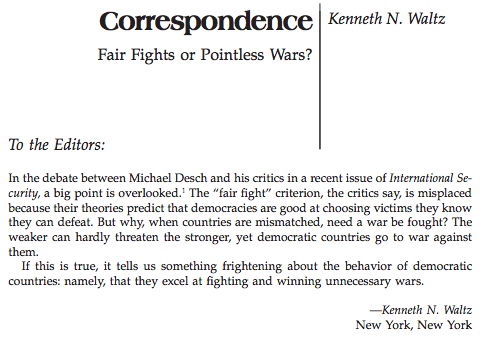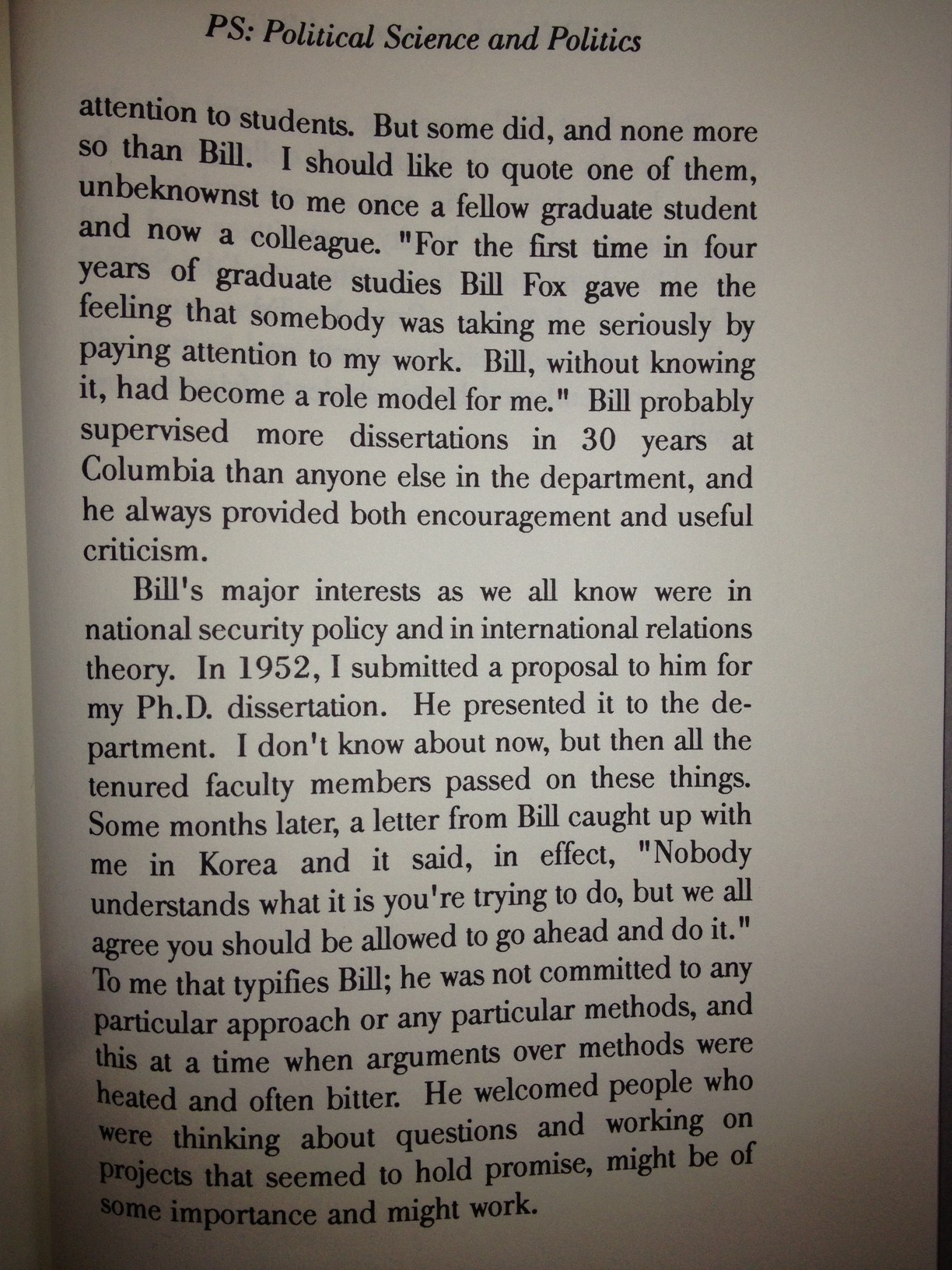Kenneth Waltz died last night. From an email sent by Robert Jervis:
It is with great sadness that I have to report that Ken Waltz died last night. As many of you know, his health had been uncertain ever since he lost much of his sight a year ago, and about a month ago he was hospitalized with pneumonia. While he recovered enough to be discharged to rehab, a combination of a return of pneumonia and congestive heart failure sent him back to the hospital a few days ago.
He was a few weeks short of 89 but until the very end remained fully lucid and engaged. Indeed he was looking forward to a trip to the UK with his daughter-in-law in the fall, and the day before he went into the hospital had lunch with Les Gelb & Henry Kissinger (& remarked that the latter’s age was showing). Despite being unable to see well enough to read, his spirits remained high until the end, which came quickly.
We will all miss him greatly both for his scholarship & his personality.
Waltz was a giant in the field. His two most important works — Man, The State, and War and Theory of International Politics — provided the framework within, and against, international-relations scholars have argued for much of the post-WWII period.
Whatever one thinks of structural realism and its progeny, Waltz got some big things right, including the dangers of military intervention on behalf of ideological crusades. He also wrote the pithiest “correspondence” piece ever likely to appear in International Security.
I didn’t know Waltz well. I took his seminar when he taught at Columbia. I found him engaging, supportive, thoughtful, and open to a wide variety of perspectives and ideas. He was kind enough to write one of my job-market letters of recommendations, for which I will always be grateful.
He spent some of his last months in an assisted-living facility in the DC area. His eyesight was failing. He apparently found it quite boring; so graduate students, including one from Georgetown, read articles to him.
A final possibly apocryphal anecdote. one that I hope readers will correct as necessary. Waltz began his doctoral studies (at Columbia) as a political theorist, but switched to International Relations. In those days, students didn’t present their dissertation proposals. Instead, their advisors did.
Waltz’s advisor, William T.R. Fox, therefore brought the thesis proposal that would become Man, the State, and War before a committee of professors. The general response? No one really understood what Waltz was doing, but, they agreed, he was a smart guy; they should just let him pursue it.
Thanks to Stacie Goddard for providing the following confirmation from Ken’s obituary for Bill Fox in PS. As she notes, the story is even better than she and I remembered it. For a remembrance from one of his actual advisees, see Steve Walt’s heartfelt post.
Daniel H. Nexon is a Professor at Georgetown University, with a joint appointment in the Department of Government and the School of Foreign Service. His academic work focuses on international-relations theory, power politics, empires and hegemony, and international order. He has also written on the relationship between popular culture and world politics.
He has held fellowships at Stanford University's Center for International Security and Cooperation and at the Ohio State University's Mershon Center for International Studies. During 2009-2010 he worked in the U.S. Department of Defense as a Council on Foreign Relations International Affairs Fellow. He was the lead editor of International Studies Quarterly from 2014-2018.
He is the author of The Struggle for Power in Early Modern Europe: Religious Conflict, Dynastic Empires, and International Change (Princeton University Press, 2009), which won the International Security Studies Section (ISSS) Best Book Award for 2010, and co-author of Exit from Hegemony: The Unraveling of the American Global Order (Oxford University Press, 2020). His articles have appeared in a lot of places. He is the founder of the The Duck of Minerva, and also blogs at Lawyers, Guns and Money.




Not apocryphal. Ken wrote the story himself in a book that was a tribute to William T.R. Fox. It’s a great essay, actually, a real nice piece of insight into Columbia at the founding of the Institute of War and Peace Studies.
Even if one didn’t agree with his perspective on international relations, it would be impossible to deny his acute intellect, penetrating analysis and independence of thought. ‘Theory of International Politics’ still holds up as a classic, the debates it generated made the modern IR discipline. His work will be debated and discussed for a long time, and deservedly so.
That correspondence was great. It really shows how realists can provide a much needed and penetrating critique of liberal IR theory and liberal statesmanship. if only Waltz had been active in the age of blogging…
Waltz was a virtually peerless figure in the world of IR theory. To write one classic is beyond most of us, to write two in a lifetime is a rare thing indeed. I remember Andrew Linklater used to tell his MA students – at that time we were co-teaching the core IR theory class in Aber – that he disagreed with everything Waltz claimed (or almost everything) but we had to engage with him because he had lifted the quality of the debate in IR beyond recognition. To illustrate this, I sometimes ask myself whether, without Waltz, would we have had Wendt – possibly Walker too?
As someone working in the field of R2P, perhaps the highest complement I could pay Waltz is that, despite almost never being cited in R2P, the progress of human protection norms is critically shaped by the system’s structure. ‘We’ might not be interested in Waltz, but Waltz is interested in ‘us’. Rest in peace Professor Waltz and thank you for your massive contribution to academic International Relations.
His Theory of International Politics was a tremendously well-done but (as is now the consensus) ultimately wrong text. And the fact that it was so excellent despite its wrongness further bumps it to the status of being an absolute masterpiece.
Please explain to this poor man how it can be that this judgement of “rightness and wrongness” so glibly refered to can be determined by one and objectivly espoused by all??
Could someone share the reference to this obituary by Waltz please?